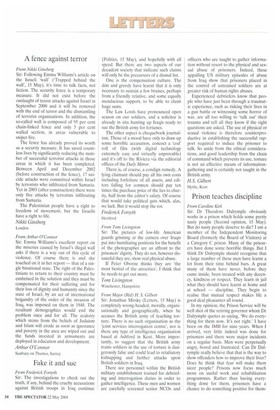Prison teaches discipline
From Caroline Kirk Sir: Dr Theodore Dalrymple obviously works in a prison which holds some pretty nasty people (Second opinion, 15 May). But do nasty people deserve to die? I am a member of the Independent Monitoring Board (formerly the Board of Visitors) at a Category C prison. Many of the prisoners have done some horrible things. But I think Dr Dalrymple should recognise that a large number of these men have learnt a lot from their time behind bars. A great many of them have never, before they came inside, been treated with any decency, kindness or respect. They learn in jail what they should have learnt at home and at school — discipline. They begin to realise that mutual respect makes life a good deal pleasanter all round.
In my opinion, the Prison Service will be well shot of the retiring governor whom Dr Dalrymple quotes as saying, 'We do everything for them now. It's not right.' I have been on the IMB for nine years. When I arrived, very little indeed was done for prisoners and there were major incidents on a regular basis. Men were perpetually angry, bored and frustrated. Can Dr Dalrymple really believe that that is the way to show offenders how to improve their lives? Does he think that fear will make them nicer people? Prisons now focus much more on useful work and rehabilitation programmes. Rather than having everything done for them, prisoners have a chance to do something positive for them
selves. OK, they have televisions in their tiny (frequently shared) cells. They have their lavatories in there, too. Scarcely the Ritz.
Caroline Kirk
Cavendish, Suffolk



















































































 Previous page
Previous page